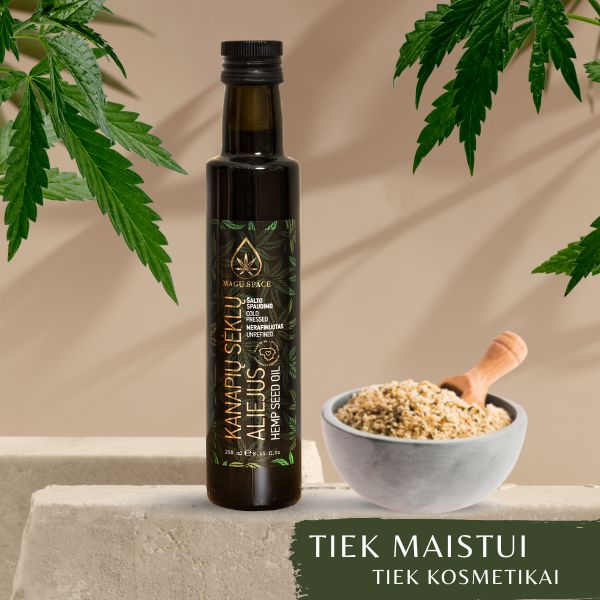Hemp oil is often mixed with CBD (cannabidiol) hemp oil, but they are not the same product. Hemp oil is produced from hemp seeds, which do not contain the same compounds as those found in the stems, leaves and flowers of hemp used to produce CBD hemp oil. However, hemp seeds contain a wide range of other beneficial nutrients, fatty acids and bioactive compounds for our bodies. So what are the benefits of hemp oil for our bodies?
Rich in Omega-3 and Omega-6 acids in hemp oil
Hemp seed oil is highly nutritious and contains a wealth of vitamins and trace elements that can benefit our skin. This oil contains about 75% polyunsaturated fatty acids, which are the good fats, and only ~10% saturated fatty acids, which are not very desirable for our bodies.
Hemp seed oil is rich in essential fatty acids, which the body cannot make on its own, so it is essential to get them from the diet. These are omega-6 (linoleic) and omega-3 (alpha-linolenic) fatty acids, in a ratio of about 3:1 in hemp seed oil. The lower the ratio, the healthier the product. Nutritionists have been concerned for a decade about food intakes that do not favour health, often at a ratio of 20:1 and so on. Excess omega-6 in the body interferes with the metabolism of omega-3 and prevents the body from absorbing it, leading to omega-3 fatty acid deficiencies and health problems. A deficiency of omega-3 acids can lead to brittle nails, dry, stringy hair and dry skin. The World Health Organisation (WHO) recommends a ratio of omega-6 to omega-3 fatty acids of 2:1-5:1. Therefore, the ratio of fatty acids in hemp seed oil is very good and
recommended.
As well as omega-3 fatsThe omega-3 fatty acids in hemp oil are much more stable than those in fish oil
and will not oxidise.

1pav. Omega-6 to Omega-3 ratio in hemp seed oil
Benefits of hemp seed oil , PMS, Menopause and skin problems
Hemp seed oil is rich not only in essential fatty acids but also in valuable gamma-linolenic acids (GLA). It is the omega-6 fatty acid that is converted into gamma-linolenic acid in a healthy body, but hemp seed oil already contains GLA. This acid ensures the balance of hormones in the body and can therefore help regulate:
GLA is also responsible for the growth of rapidly regenerating tissue cells in the skin, so a lack of these acids in the body can lead to dry skin, scaly dermatitis, faster ageing and puffiness and fatigue. Acne has also been shown to reduce gamma-linolenic and linoleic acids in skin oils, making it harder to remove the oil and causing acne breakouts. GLA is also involved in anti-cellulite effects, prevention of atherosclerosis, and improving memory and responsiveness.
A 2014 study suggests that hemp seed oil may be useful in treating skin conditions such as:
- eczema,
- pink,
- seborrhoeic dermatitis,
- psoriasis – scaly skin,
- varicose eczema,
- flat lichen,
- dermatitis.
When used consistently, hemp seed oil strengthens the skin and makes it more resistant to bacterial, viral and fungal infections, thanks to its essential fatty acids and other micronutrients such as vitamin A, E, calcium, magnesium, phosphorus, potassium and others.
Oleic acid in hemp oil
Oleic acid, also known as omega-9 essential fatty acid, is also abundant in hempseed oil, but is absent from the much-loved fish oil. The body can make this acid itself, but only if it has sufficient omega-6 and omega-3 fatty acids. Oleic acid helps our body’s metabolism, as well as lowering bad cholesterol and improving cardiovascular health.

2pav. Acids in hemp seed oil
Using hemp seed oil
Benefits of regular cannabis oil consumption:
- An excellent source of essential fatty acids, including Omega-6, Omega-3 and GLA acids;
- Strong nails, growing hair and softened, healthy skin;
- Improved functioning of internal organs, especially digestion and metabolism;
- Lower blood cholesterol;
- Reduced blood pressure;
- Better heart function and stronger blood vessels;
- Reduced PMS and menopausal symptoms and better hormone balance;
- Reduces inflammation and arthritis symptoms;
- Faster muscle recovery after training;
- Stronger immunity.
The recommended intake of hemp seed oil is 14-28ml, i.e. 1-2 tablespoons. Hemp oil has a nutty flavour, so feel free to add it to salads, porridges and other dishes, but under no circumstances should you heat the oil, which can lead to the formation of unhealthy trans-fatty acids and an increase in peroxide levels. You can also use cold-pressed hemp seed oil in cosmetic applications, or simply apply it to your skin. Once opened, store the bottle tightly in a refrigerator or other cool place.
Sources:
[1] Sova N. A., Lutsenko M. V., Vasarab-Kozhushna L. D., Yenina N. U. (2017), Seeds of non-narcotic hemp is promising biologically active raw materials for the food industry, Storage and processing of grain, 9(217), pp. 16-19.

